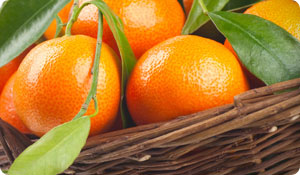
No medical expert's going to advise you to eat a tangerine a day to keep the doctor away. But the juicy little fruit could turn out to have awesome health benefits. It contains a substance called nobiletin, which may protect against obesity and type 2 diabetes, according to a new study.
For their research, scientists at the University of Western Ontario in Canada looked at two groups of mice. One group of mice got the typical "western" diet: high in fats and sugars. The second group was fed the same diet, along with nobiletin, which is found in abundance in tangerines. Eating a poor diet, the mice on the high-sugar, high-fat diet alone developed obesity and other symptoms that precede type 2 diabetes. But the mice in the second group didn't develop these symptoms.
"The nobiletin-treated mice were basically protected from obesity," said Murray Huff, a professor of biochemistry and medicine and director of the vascular biology research group at Robarts Research Institute at the University of Western Ontario, according to a press release. The research, which he conducted with co-author Erin Mulvihill, a Ph. D. student, was published in the journal Diabetes.
"The study really paves the way for future studies to see if this is a suitable treatment for metabolic syndrome and related conditions in people," Huff said, according to the press release.
In a phone interview, Huff told QualityHealth that the next step would be to conduct tests of nobiletin with people. "We need to determine if we can source a sufficient quantity of nobiletin to begin studies, and then to move forward to determine if the nobiletin has the same metabolic outcome we observed in our mouse model," Huff said.
Nobiletin is one of many flavonoids, explains Suzanne Steinbaum, MD, preventive cardiologist at Lenox Hill Hospital in New York City. Flavonoids, which are also found in dark chocolate, red wine, and blueberries, have a protective effect on the heart, she says.
"There are different kinds of flavonoids," she explains. "They dilate the arteries and make it less likely that you will get blood clots or have high blood pressure."
The research on nobiletin "will spark a discussion in whether this particular flavonoid can protect against diabetes and atherosclerosis," Steinbaum says. "Research is needed in humans."
Just two years ago, Huff's research attracted widespread attention when he found that another flavonoid, this one in grapefruit and called naringenin, had a protective effect against obesity and other symptoms of metabolic syndrome.
For the moment, there's no need to rush out and lay in a big supply of tangerines. "There are big hurdles to climb," Huff told QualityHealth. "It's a little bit difficult to get nobiletin in purified quantities that would meet regulatory approval, and we also need to do toxicity and safety studies with the substance."
Sources:
Mulvihill, Erin E, Huff, Murray W., and other authors, "Nobiletin Attentuates VLDL Overproduction, Dyslipidemia, and Atherosclerosis in Mice with Diet-Induced Insulin Resistance." Diabetes. Vol. 60. May 2011.
"Substance in tangerines may protect against obesity and type 2 diabetes." 7 April 2011. eCanadaNow.com.
http://www.ecanadanow.com/health/2011/04/07/substance-in-tangerines-may-protect-against-obesity-and-type-2-diabetes/





